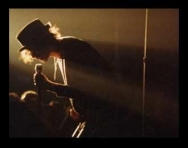Music |
Peter Wolf
By
Published: Feb 26, 2013
Category:
Rock
I have reached such a state of crotchety that I can no longer bear to hear someone talk about his or her "journey." That meant I had to skip the Academy Awards, where winners are more likely to have journeys than careers. Fortunately, Peter Wolf was playing in a club downtown and Dominique Browning was up for an adventure — my wife, who has seen Wolf so often she could sing backup, stayed home to watch the red carpet with the child — and off we went. Thrills followed.
If you follow pop music at all, you may be thinking: Peter Wolf? Is he still alive? And if so, is he using a walker?
Very much alive, thank you. He may be 67, but he’s still got lightning moves — if I were the air on stage, I’d want to sue him for those karate chops and unanticipated spins. And the songs hold up. Indeed, as he rolls them out, they add up — the world may not know it, but this guy has created a collection of classics.
Oh, right. The greatest hits of the J. Geils Band.
No, wrong. The greatest hits of an underappreciated solo career.
Let’d do the chronology.
Peter Wolf, a New Yorker, never went to college. Officially, that is — he liked to go to different colleges and pretend he was a student. His reason: he loved to draw. And colleges had great art studios. (He also made friends on every campus. At Brandeis, he met Jon Landau, who would later write for Rolling Stone and manage Bruce Springsteen. On another campus, he became the roommate of a filmmaker named David Lynch.)
One drunken night, at a party where a band was playing and everyone was pounding liquor back, the singer forgot the lyrics. Wolf jumped in and finished the song. A light bulb went off. He got deeper into music when he and a friend bought a small Boston FM radio station; Wolf was pressed into service as a DJ.
He joined up with guitarist J. Geils, and their band quickly became a Boston favorite. (The band, for contractual reasons, was named after Geils.) A manager heard them, thought they were a black blues band from Chicago, and signed them. Fame — and, for Wolf, marriage to Faye Dunaway — followed.
You cannot have avoided their hits: “Looking for a Love” and “First I Look at the Purse” and, of course, “Centerfold,” about a guy who opens a skin magazine and gets a rude surprise:
My blood runs cold
My memory has just been sold
My angel is the centerfold
By the time that song made everyone aware of the J. Geils Band, the group had been together for more than a decade. They broke up; Wolf began a solo career.
As a solo act, Wolf had an advantage — his friends are Mick Jagger and Keith Richards and Steve Earle, he knows a million songs in a number of genres, and he can sound ancient as Moses or fast-rapping as a kid on Red Bull.
His two most recent CDs were produced by friend-of-Butler Kenny White, who clearly knows how to get the best from the talent. They are equally superior to most anything else because they do that rare thing: They hang together. Wolf makes a tour of the genres — blues, country, rock, soul — but there’s a unifying intelligence. In the age of the 99-cent-download, this is no small achievement.
Let’s start with "Sleepless." It has one of everything. A remake of "Homework," a classic blues rocker. A country duet with Mick Jagger — who clearly missed his calling as a back-up singer — and a dynamite refrain: “I’m holding on/to nothing but the wheel.” Keith Richards shows up on a Sonny Boy Williamson number. Steve Earle twangs along on a boozy “Some Things You Don’t Want to Know.” And there’s an occasional song like “A Lot of Good Ones Gone” that acknowledges how much water is under Wolf’s bridge. [To buy the CD of "Sleepless" from Amazon, click here. For the MP3 download, click here.]
Eight years later, Wolf released "Midnight Souvenirs." Again, every food group is represented: duets wth Neko Case, Shelby Lynne and Merle Haggard, and an homage to Willy DeVille. [To buy the CD of "Midnight Souvenirs" from Amazon, click here. For the MP3 download, click here.]
At the club, Wolf delivered a rich buffet. Growin’ Pains. A Lot of Good Ones Gone. Watch Her Move. And "Tragedy," done solo, bringing me back to the home video of Wolf and Lynne rehearsing in a dressing room:
There is music you buy and it sounds new for a while, and then you don’t care. And then there is music you buy and it sounds old, like you’ve always listened to it and always will. Peter Wolf is in the second category. Very few are.
——————
for Tim Mayer (1943-1988) and Peter Ivers (1946-1983)


